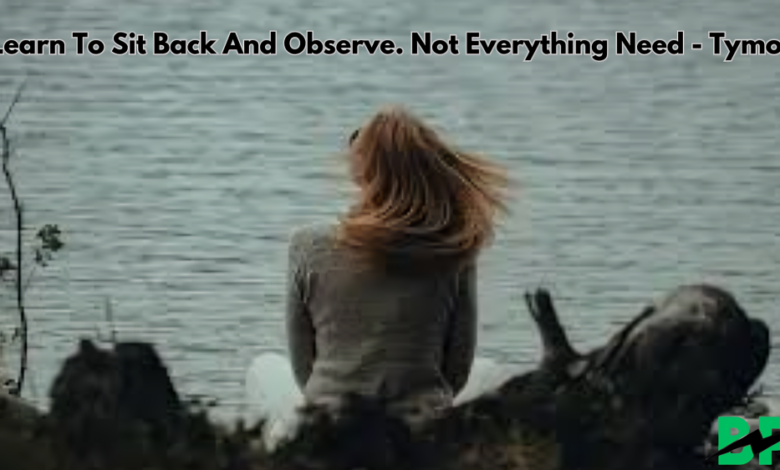Learn To Sit Back And Observe. Not Everything Need – Tymoff

Learn To Sit Back And Observe. Not Everything Need – Tymoff In a world filled with constant stimulation, endless demands for our attention, and a society that values immediate responses, learning to sit back and observe has become a profound skill. This simple, yet powerful, piece of advice—often attributed to Tymoff—suggests that not everything we encounter needs a reaction. It calls for a shift in perspective, encouraging us to move away from habitual responses and to embrace observation and patience as essential tools for a balanced, meaningful life.
The Value of Observation in a Reactive World
Today, it’s easy to get caught in the loop of reacting immediately to every situation. Social media notifications, urgent emails, and other distractions constantly demand our attention, leading us to make decisions in a reactive rather than thoughtful manner. Learning to sit back and observe helps us detach from this cycle and gain a new perspective on life. By pausing, we allow ourselves time to process information, assess situations, and make decisions that are more aligned with our core values and intentions.
Why Observation is Key to Personal Growth
Observing rather than reacting allows us to:
- Gain clarity on situations by understanding all aspects before acting.
- Enhance emotional resilience by reducing stress responses.
- Develop stronger interpersonal relationships as we respond thoughtfully rather than impulsively.
- Create a habit of mindfulness, promoting mental well-being.
Incorporating this approach in our daily lives can profoundly impact how we experience the world and interact with others.
The Power of Silence and Reflection
One of the most impactful aspects of observation is silence. Silence allows us to think without the noise of constant input. It gives us the space to reflect, recognize our emotions, and understand our true reactions.
Benefits of Embracing Silence
- Increases Focus: When we are not constantly responding, we have the freedom to concentrate fully on tasks or situations.
- Promotes Self-Understanding: Silence helps us connect with our own thoughts and feelings, offering insights into what truly matters to us.
- Strengthens Relationships: In silence, we become better listeners, a skill essential to building strong relationships.
Learning to sit back and observe brings us closer to these benefits by making silence a tool for gaining perspective, rather than a reaction or immediate response.
Not Every Situation Needs a Reaction
Many people feel pressured to respond to every question, comment, or situation they encounter. This pressure often results in superficial or emotionally driven reactions, which can lead to misunderstandings, conflicts, and unnecessary stress. Choosing when and how to respond is a form of personal power and discipline.
When to Respond and When to Observe
- Evaluate the Importance: If a situation doesn’t impact your values or goals, it may not need your immediate attention.
- Consider the Emotional Charge: If you feel a strong emotion, take a moment to observe your feelings before reacting.
- Ask if Your Input Adds Value: Sometimes, the best contribution is silence, allowing others to express themselves fully.
By following these steps, we can learn to sit back and observe more effectively, cultivating inner peace and a sense of control over our reactions.
Developing Patience Through Observation
Patience is not just about waiting; it’s about how we wait and the mindset we cultivate during that time. Learning to sit back and observe rather than react is a practice that builds patience.
How Observation Enhances Patience
- Encourages Mindfulness: When we observe without reacting, we focus on the present moment, becoming more mindful of our surroundings and feelings.
- Teaches Acceptance: Observation helps us accept things as they are, rather than as we wish them to be.
- Strengthens Emotional Control: Practicing patience through observation helps us stay calm and centered, even in challenging situations.
Patience, developed through the art of observation, becomes a guiding force in how we respond to others and manage our own lives.
FAQs
Q: What does “learn to sit back and observe” mean?
A: “Learn to sit back and observe” suggests cultivating a habit of pausing and assessing situations before reacting. This approach encourages mindfulness, patience, and emotional resilience, enabling us to respond thoughtfully rather than impulsively.
Q: Why is it important to not react to everything?
A: Not reacting to everything can help reduce stress, minimize conflicts, and lead to more thoughtful, meaningful interactions. By choosing when to respond, we conserve our energy and maintain inner peace.
Q: How can I practice observation in daily life?
A: Begin by taking a few moments each day to pause before responding. Notice your immediate feelings, thoughts, and impulses. Try to assess situations from a neutral perspective and ask yourself if a reaction is necessary. With time, this practice will become more intuitive.
Conclusion
Learning to sit back and observe is more than just a simple mindset shift; it’s a transformative approach that helps us navigate life with clarity, patience, and resilience. In a world driven by immediate reactions, choosing to pause allows us to break free from compulsive habits and respond in ways that are more thoughtful and aligned with our true intentions. Embracing observation fosters emotional strength, improves relationships, and enhances our overall well-being. By practicing the art of observation, we can approach life with greater wisdom, choosing responses that bring peace and purpose into our lives.




